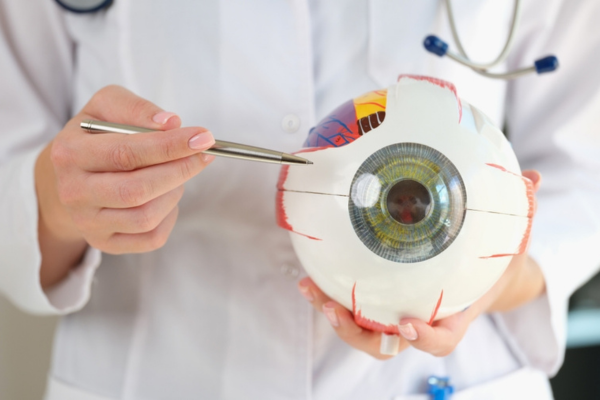Retinal damage can be very severe if it is left untreated. The retina is a thin layer of tissue located at the back of the eye which plays a vital role in receiving and processing light, it enables us to see. So, any damage to this part can cause vision loss, making it crucial to recognize the symptoms early.
Symptoms of Retinal Damage
- Blurred or Distorted Vision: One of the first signs is a gradual blurring of vision, making it difficult to see things clearly. Straight lines may appear wavy, and it may become challenging to focus on detailed work.
- Floaters and Flashes: A common symptom includes seeing floating specks or flashes of light, especially in peripheral vision. These may appear suddenly and increase in frequency, indicating a possible retinal tear or detachment.
- Loss of Peripheral Vision: Peripheral or side vision may gradually decrease, leading to a “tunnel vision” effect. This narrowing of vision is often associated with conditions like retinal detachment or damage from diseases such as glaucoma.
- Dark Spots or Shadows: Experiencing dark spots or shadows, particularly in the central or peripheral vision, is a serious sign of retinal damage. This could indicate bleeding or fluid accumulation under the retina.
- Color Changes: Changes in the way colors are perceived, such as reduced brightness or intensity, can be a symptom of retinal deterioration, especially if they affect one eye more than the other.

How to Prevent Retinal Damage
- Regular Eye Checkups: Regular eye examination is essential for early detection of retinal issues. This is especially important for people above 40 years or those with diabetes, hypertension or a family of retinal conditions.
- Manage Underlying Health Conditions: Conditions like diabetes and high blood pressure can cause retinal damage. Managing these conditions through medication, diet and lifestyle changes can help protect your retinal health.
- Protect Your Eyes from UV Light: Prolonged exposure to ultraviolet (UV) light can harm your eyes. Always wear sunglasses with UV protection when outdoors, even on cloudy days, to reduce your risk of retinal damage.
- Healthy Diet for Eye Health: Consuming a balanced diet rich in antioxidants, vitamins C and E, and omega-3 fatty acids can help maintain good retinal health. Leafy greens, fish, and colorful vegetables are particularly beneficial for your eyes.
- Avoid Smoking: Smoking increases the risk of retinal diseases like age-related macular degeneration. Quitting smoking is one of the best ways to protect your eyes and overall health.
Conclusion
Recognizing the symptoms of retinal damage early is crucial to preventing permanent vision loss. Regular eye checkups, managing health conditions, and taking steps to protect your eyes can reduce your risk of retinal damage and help you maintain clear, healthy vision. If you notice any of the symptoms mentioned, it’s important to seek immediate medical attention to prevent further complications.


